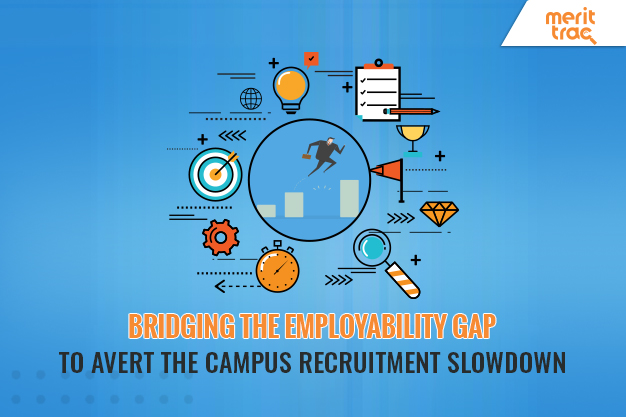
Bridging the Employability Gap to Avert the Campus Recruitment Slowdown
Date: 17/08/2018 | Posted by: MeritTrac | Category: Employability , Education
Fresher’s aspiring to get a job through campus placements will find it harder this year as compared to previous years. In fact, according to a recent Wisdom- Jobs survey, on-campus fresher hiring has declined by nearly 21% in Tier-II and Tier-III institutes over the last two years, and the number of companies visiting these campuses has dropped by 30%. What could be possible reasons for this? 73% of candidates lack communication skills, 58% are found deficient in analytical and quantitative skills, and only 4% of candidates have the desired technical capabilities, say industry experts.
The problem isn’t limited to non-premium institutions alone
The challenges that prevent Tier-II and Tier-III institutes from appearing attractive to corporates are obvious – they lack a recognized brand name, and compensation offered is often low as compared to premium institutions. While Tier-II and Tier-III institutes are hit most by the general decline in campus hiring across key sectors such as IT services and engineering, the premium institutes too are not spared. Of the IITians who appeared for campus recruitments, only 66% landed a job in 2016-17 as against 79% in 2015-16. As most entry-level tasks that were typically done by fresher’s are now being automated, companies are no longer looking for generalized skills. Instead, corporates are willing to pay even 35 to 40% higher for candidates having an understanding of next-gen technologies such as Artificial Intelligence (AI), Machine Learning (ML), data science, Internet of Things (IoT), robotics, and others which seems to be the emerging skills of the future.
Overall, the mismatch between the demand and supply of job-ready candidates is creating an ever widening employability gap. At current skills level, 53% of college graduates fall short on the employability scale. Only 22% of candidates are ‘readily employable’ i.e. have skills which can get them a job in most of the sectors, whereas around 25% need some kind of training input to become employable.
How can institutions bridge the employability gap?
The solution lies in identifying core areas such a cognitive abilities, communication skills, and overall personality where students lack and providing them the necessary training to enhance skill development. To be able to do this at scale, institutions need the right assessment solutionsas well as industry connect to know the trending skills and capabilities that will be required in the future. AceTrac by MeritTrac, India’s premier online assessments company, is one such solution that aims to bridge the employability gap by simplifying the hiring process for students, institutions as well as corporates. This assessment based employability enhancement program involves three assessment interventions:
- Diagnostic assessment: Identifies specific areas of strengths, weaknesses and improvements for each student and generates an Interest Map Report that compares student’s abilities against the employability scale.
- Review assessment: Conducted 12-18 months after the diagnostic assessment, this aims to track the candidates’ progress on the core areas as identified. Recommendations are provided by comparing the progress against the employability scale.
- Employability assessment: This is the final round and is conducted two to four months before the campus recruitment to highlight the candidate’s strengths and areas of improvement. This also includes a detailed personality assessment.
Perfect matching is the way to beat the slowdown
Given the always-on business environment today, organizations need candidates who can hit the ground running from day one. Educational institutions must customize their curriculum and training to match industry requirements as best as possible. To do so, it is critical to leverage scientific formative assessments to gauge skills, abilities and personalities of candidates for gaining valuable insight into their career profile and build a career path. After all, organizations are eyeing candidates- who can easily adapt to different roles, work with teams and leverage their creative thinking to help organizations succeed.












 Sales Hotline: USA: +1 646 916 0939 / Others: +91 80619 14700
Sales Hotline: USA: +1 646 916 0939 / Others: +91 80619 14700


